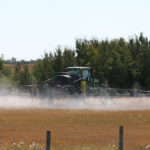Tag Archives pest management regulatory agency

Feds to change pesticide oversight

Feds’ lambda-cy ruling is unworkable

Caution advised when controlling flea beetles
Canola growers must know for sure their crops won’t be used as livestock feed before using lambda-cyhalothrin this year
Effective April 29, it is illegal to apply lambda-cyhalothrin products to canola and other crops that will be used as livestock feed in Canada.
Crop protection rulings challenge producers
Canola producers will have to decide whether to play it safe and avoid using lambda cyhalothrin for any purpose this year
Within about the past two years, farmers have lost a few important tools from their crop protection toolbox.
Caution advised when choosing flea beetle treatment

Loss of strychnine a long time coming
Pesticide was deregistered from 1992-2001, and the process to ban the product began again in 2020 after a 2018 review
The pesticide, registered in 1928, had already been deregistered from 1992 to 2001 over environmental concerns and a 2018 review found the same issues with the potential for secondary poisoning.
Prairie farm groups vow to fight PMRA strychnine ban

Pesticide label change transition times upheld
Environmental groups had argued the PMRA didn’t have the ability to phase in changes it made to product registrations
Pierre Petelle is breathing a sigh of relief in the wake of a Federal Court ruling reaffirming the Pest Management Regulatory Agency’s authority to set phase-in periods for amended pesticide registrations. “We’re very pleased with the outcome because it would have been tremendously impactful,” said the president of CropLife Canada. The David Suzuki Foundation, Friends […] Read more
Ag Drag
PMRA’s decision to reduce international engagement when it comes to MRLs could impede Canadian agricultural exports.

PMRA denies ‘incompetence’, explains 2,4-D review
Official with Canada’s regulatory agency explains the evaluation process that led to the chemical being deemed safe
The response was fast and furious when Health Canada’s Pest Management Regulatory Agency announced in late March that 2,4-D is safe and doesn’t cause cancer. Many Canadians, at least those with little faith in Health Canada, went online to vent their fury. A Western Producer story on Health Canada and its special review of 2,4-D, […] Read more




